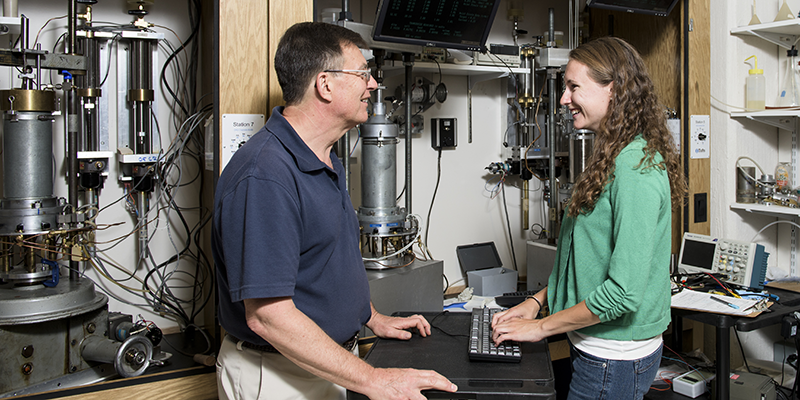Master of Science Degree

The Department of Civil and Environmental Engineering (CEE) is an interdisciplinary department that provides flexible and rigorous training within the intellectually rich environment of our highly ranked university. Master’s degree programs in CEE address a diverse mixture of problems in fundamental engineering science as well as applications. Our faculty is involved in a diverse array of innovative research efforts focused on four key thematic areas: climate and energy, extreme events, health and the environment, and resilient systems. Civil and Environmental Engineering at Tufts is focused on applying engineering and science to help society anticipate and respond to emerging challenges at the intersection of people and natural and built systems. The faculty bring this fundamental approach and priority on relevance to the classroom.
The department offers a wide range of area focused degrees that are relevant to the CEE profession. These degrees provide deep technical expertise as well as the breadth to provide context. We support both full and part-time study options to service the needs of a diverse student population. The majority of the course options are provided using a hybrid format and/or offered in late afternoons or early evenings to allow remote and in-person learning with maximum time flexibility.
You can select either a more traditional research thesis option or a non-thesis option. Classes are small and provide extensive interaction with the instructor. The thesis option provides students with the best of both worlds: a student-centered experience at a top-notch research university. You’ll immerse yourself in cutting-edge, interdisciplinary research led by innovative faculty. Scholarships are available for some School of Engineering master's and certificate programs.
Master of Science degrees require a minimum of 30 credits and the fulfillment of at least 10 courses at the 100-level or above with grades of S (satisfactory) or at least a B-. MS-level thesis research is normally equivalent to two courses (6 credits).
Full-time study
Full-time students can complete their degree requirements in two to four semesters, depending on the specifics of the program; full-time study also provides a great foundation for embarking on a doctorate program and the opportunity to immerse in the Tufts environment. The non-thesis degree option can be completed in two to three semesters. Students may choose to complete a thesis as part of their degree program, in which case the program may require three to four semesters to complete. The thesis research typically replaces 6 credits of course requirements.
Part-time study
Getting on track for the next promotion, a new position, or a new technical field can mean working around your busy schedule. Our MS programs are also offered as a part-time hybrid program, combining in-person and virtual class time. The part-time MS can be completed at your own pace (one or two courses per term) and is designed for the professional learner working in the greater Boston area and beyond. The thesis option is available for part-time students interested in gaining some research experience. We also work with local companies to offer a work-study program providing entry level employment in parallel with earning a graduate degree. Our campus is conveniently located on the soon to be extended MBTA green line. The part-time MS program combines academic study that is accessible around work commitments through virtual classrooms, late afternoon/evening classes, and networking opportunities through both the Tufts alumni network and local professional organizations. To learn more about our part-time programs, contact Laura Sacco (laura.sacco@tufts.edu)
MS in Civil and Environmental Engineering
Civil and Environmental Engineering is an extremely diverse profession. The department provides five focused MS fields of study targeted at specific areas of the profession to address key societal issues related to how and where we live, work, and interact. Each field of study is designed to have a fundamental core technology as well as elective flexibility to tailor the program to individual student interests. The five fields of study are in civil and environmental systems engineering, environmental health, environmental and water resources engineering, geosystems engineering, and structural engineering and mechanics. MS students have excellent networking opportunities through our weekly CEE Seminars and other annual networking events.
MS in Offshore Wind Energy Engineering
The MS program in Offshore Wind Energy Engineering is offered through the Department of Civil and Environmental Engineering. This program offers graduate-level education in offshore wind engineering, policy, and project management for students seeking jobs in the emerging global offshore wind energy industry. While this three semester program is designed for full-time students, options for part-time study are available.
MS in Bioengineering (Environmental Biotechnology track)
The Bioengineering (MS) program provides a broad engineering and biotechnology curriculum, while offering a focus on a specific engineering track that best fits students' interests and career choices. This combination gives our bioengineering graduates professional flexibility, a distinct competitive advantage in the ever-changing field of bioengineering. The Department of Civil and Environmental Engineering is the home department for bioengineering students in the Environmental Biotechnology track.
Dual Degree Master's Program (with Tufts Gordon Institute)
Develop your innovation, leadership and management skills and build your technical depth with the Dual Degree Master's Program. You’ll earn two degrees: an MS offered by the Department of Civil and Environmental Engineering, and an MS in Engineering Management (MSEM), Innovation & Management (MSIM), or Technology, Management, & Leadership (MSTML).
Learn more about the Dual Degree Master's Program and application requirements or contact tgi@tufts.edu for more information.
Joint MS in Environmental Engineering Policy and Planning
The MS in Environmental Engineering Policy and Planning is a Joint MS degree in Civil and Environmental Engineering and Urban and Environmental Planning. The program trains professionals with both technical engineering skills and a policy perspective in terms of planning and implementation.